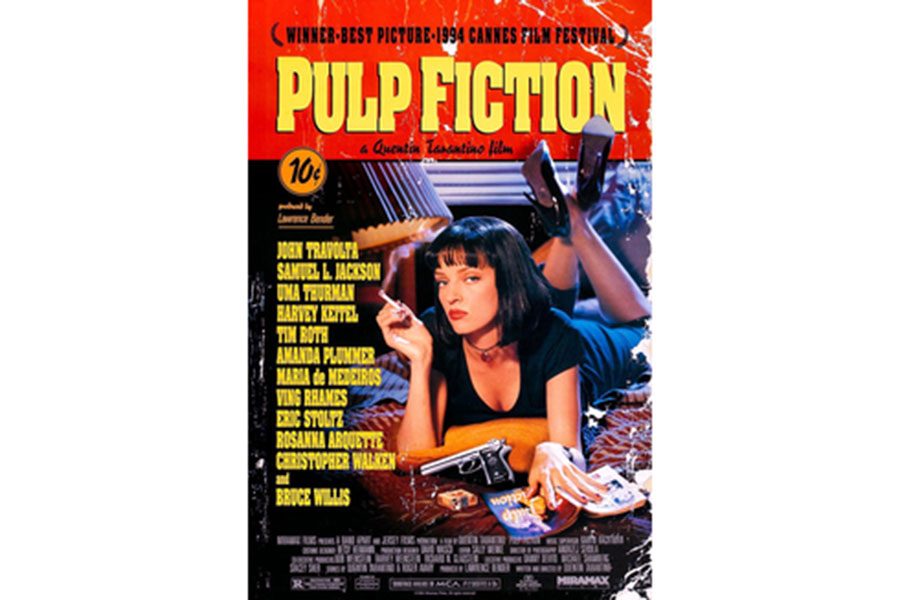Opinion | Bona Fide | “Pulp Fiction”
A Review of Quentin Tarantino’s “Pulp Fiction”
Miramax. Image used under fair use exemption to copyright law.
WARNING: “Pulp Fiction” is rated R by the MPAA for strong graphic violence and drug use, pervasive strong language and some sexuality.
“Pulp Fiction” is on my must-see list because 24 years after its release, the movie is just as relevant and powerful.
Quentin Tarantino (“Reservoir Dogs,” “Inglourious Basterds,” “Django Unchained,” etc.) is one of the few living directors to master the art of filmmaking. He changed cinema with “Pulp Fiction” (1994), his second movie.
Although he’s also written some of the best works to be put to screen, “Pulp Fiction” unflinchingly and unapologetically takes a look at humanity.
It was the most innovative film in its era. From its non-linear narrative to its deceptive themes, “Pulp Fiction” is a sensation.
Tarantino defied film in every sense with “Pulp Fiction.” The movie has no strict storyline but rather a beginning and three key “incidents”:
- Vincent Vega (John Travolta) and Marsellus Wallace’s Wife (Uma Thurman)
- The Gold Watch
- The Bonnie Incident
While there is no singular, titular character, Tarantino manages to intertwine separate situations all over the span of a few days.
The untitled opening scene reveals Vincent Vega and Jules Winnfield (Samuel L. Jackson) conversing over Europe’s subtle differences between the U.S.–especially McDonald’s– while they are on the way to take care of their boss’s (Marsellus Wallace played by Ving Rhames) dirty work.
There isn’t much to be said about the plot, as there is no plot. Yes, there is a series of events, but “Pulp Fiction” is all about the moments and the characters. The plot is a mere tool to further the development of the characters and their witty conversations that keep eyes glued to the screen.
The mastery of dialogue and ability to develop characters is why “Pulp Fiction” is one of the best films of all time.
“The path of the righteous man is beset on all sides by the iniquities of the selfish and the tyranny of evil men. Blessed is he who, in the name of charity and good will, shepherds the weak through the valley of the darkness. For he is truly his brother’s keeper and the finder of lost children. And I will strike down upon thee with great vengeance and furious anger those who attempt to poison and destroy my brothers. And you will know my name is the Lord when I lay my vengeance upon you.”–Jules Winnfield
Although each character in “Pulp Fiction,” and I mean every single one, gets their 15 minutes of fame, Samuel L. Jackson is the show stopper. Jules Winnfield steals the show with perfect transformation and evolution as a character.
Jackson’s dialogue, relaxed yet wholly eye-opening, is why he outshines the rest. He goes through multiple transitions and even has a change of heart during a scene of divine intervention. “Pulp Fiction” put Jackson on the map as a force to be reckoned with.
But it’s not only the writing, “Pulp Fiction” takes huge leaps. It reveals gritty truths, explicit drug use and one scene in particular that would scar any 12-year-old.
From simple, yet so very insightful diner conversations to John Travolta’s character stabbing Uma Thurman’s character in the heart with a shot of adrenaline, “Pulp Fiction” does not step on the brakes until the final credits roll.
Taking the world by surprise, “Pulp Fiction” swept Cannes Film Festival in 1994. It received the Palme d’Or (Golden Palm) award, which is the highest award possible at the Cannes Film Festival given only to 18 American films to date.
After the unexpected phenomenon of Tarantino’s masterpiece at Cannes, it went on to be the first indie film with a wide release in its first week, garnering over $200 million worldwide.
Tarantino created something profoundly-special in 1994 becoming one of the most critically-acclaimed films of all time and 10th highest grossing film of 1994 all on a budget of $8 million.
Also nominated for seven Academy Awards, “Pulp Fiction” garnered love among all. Well-deservedly winning Best Writing, Screenplay Written Directly for the Screen, “Forrest Gump” dominated the other awards.
The main reason “Pulp Fiction” will stand the test of time is its timelessness. Twenty-four years later, Tarantino’s masterpiece is just as relevant and groundbreaking as it was when it released in 1994.
Your donation will support the student journalists of Eureka High School - MO. Your contribution will allow us to purchase equipment and cover our annual website hosting costs.

This is Margherita's fifth semester on staff where he serves as an opinions writer for the EHS_hub. Marghertia enjoys discovering new music, traveling...



















